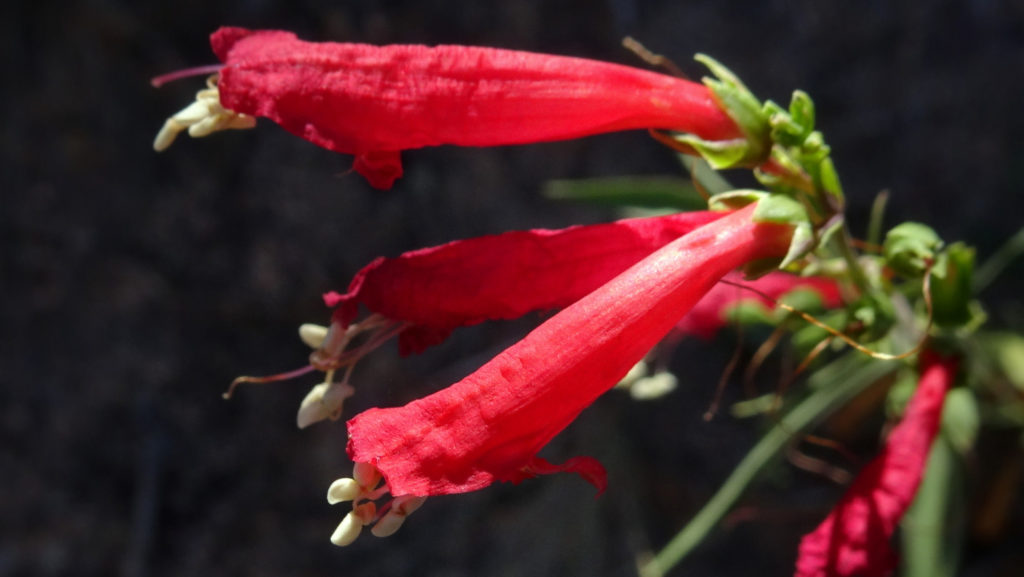“Blessed are the pure in heart, for they will see God.”
— Matthew 5:8
Hiking in the mountains above LA not long ago, I spied a single scarlet penstemon, almost lost amidst the chaparral. Bending down to peer more closely — the saffron innards, the stamen shrouded with delicate lettuce-green hairs — I was suddenly seized with the mystery of all the unseen beauty in the world.
Some little flower in the forest that lives and, unheralded, dies. The late pianist Glenn Gould, playing a Bach partita alone in his Toronto studio at night, the fading notes unheard except by him. My friend Maureen, suffering from mouth cancer: the crooked part in her hair as she bent to spit into a Ralphs grocery bag; her white hand as it moved across the notepad writing messages — because talking hurt too much: beautiful, every cell of her, and when she died, where did that beauty go?
It seems we should die of sorrow for all the beauty that’s forever gone; for the beauty that we defiled, or were too blind to see. The paintings, sculptures, poems, and symphonies over which unknown artists labored their whole lives and their next of kin tossed casually onto the trash heap. The beauty of St. Maria Goretti, the Italian girl who, in 1902, was stabbed to death for refusing to yield her virginity. The beauty of Christ as he hung on the cross, a virile, emotionally sensitive 33-year-old man, scourged, spat upon: his body butchered. Resurrection.
One thing the Resurrection seems to say is that beauty never goes unseen; it doesn’t go to waste. Another is that pain and suffering, if consciously undergone in love, give us the eyes to see beauty to which the world is blind.
Twenty-five years ago, my father died. At the age of 78, he was worn out: a retired bricklayer with congestive heart failure, liver disease, and a diabetes-induced gangrenous ulcer inching up one leg.
My seven brothers and sisters and I came home to New Hampshire and, for a week, sat vigil with him in the family living room. We were there, along with our mother, when he breathed his last.
We held hands around him, and said the Lord’s Prayer, and then the hospice nurse and my brother Tim carried my father from the armchair over to the hospital bed and, preparing to bathe him, removed his pajamas.
I’d never seen my father naked, and what shocked me — sent a pang to my own groin — was not his nakedness, but his beauty: his shoulders, the whiteness of his loins, his ruined feet. There is Christ, I thought wonderingly. That is Christ.
I am only five years younger than my father was when he died. “Everything that’s ripe wants to die,” Nietzsche said, a thought that seems to rise to mind each time I look in the mirror. To lose our looks (such as they were, or are), is painful, but maybe the less beauty we have, the more we’ll want to share; the more we’ll realize that whatever beauty we have is not to keep for ourselves, or to dole out to the people who will give us something in return.
It’s for everyone and everything. The crackhead on the corner. Children. Old people — especially old people. The little flower in the forest — even if I never see it — is somehow for me.
Would life be life if we never died? Would beauty be beauty if we knew it would never fade? Even in the resurrection, Christ resisted returning unscarred, “whole” — for then he would no longer have been like us.
“The End of FIRPO in the World,” published in “Pastoralia” (Riverhead Books, $18) by contemporary writer George Saunders, is one of the most beautiful short stories I know.
The protagonist is a boy who, like us, is not cared for enough, appreciated enough, noticed enough; like us, knows it’s due at least in part to his own defects; like us, thinks too late of the snappy comeback and fantasizes about putting his adversaries in their place.
He’s riding around his suburban neighborhood one summer afternoon, plotting innocent revenge on the people who’ve slighted him, when he’s blindsided by a car, flies off his bike, and bounces off a tree. He’s lying on the sidewalk, mortally wounded, when a Christ figure comes upon him, all the more Christ-like because, as Christ usually is, he’s in disguise: an old man with coffee breath and “hairy nips.”
The boy is twitching in a pool of blood. “Oh boy, oh God,” the man says. “Say something, pal, can you talk?” The boy is dying and, like most of us will when our time comes, wishes he could have done better, made his mother happier, lost some weight.
He is thrashing, and the old man bends over him and whispers, “You are beautiful, beautiful. God loves you, you are beautiful in His sight.”
A strange thing happens upon reading those words: this clumsy boy, who thinks he’s done everything wrong, does become beautiful in our eyes.
And by saying them, the old man with hairy nips — the one we barely notice — becomes beautiful, too.

